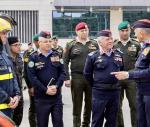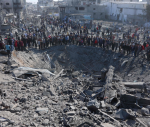You are here
Repairing Jordanian-Syrian relations
Jul 11,2018 - Last updated at Jul 11,2018
During the lifetime of the Arab League, already 68 years old, it is rare to locate a period during which inter-Arab relations were all good. Problems of a different nature routinely existed bilaterally and multilaterally. The current state of affairs attests to this reality.
At no time was the Arab League, with its ambitious Charter, able to adequately resolve Arab disputes. Often, the league failed to maintain a minimum measure of neutrality by being compelled to take sides in many inter-Arab conflicts, thus, betraying its original mission in emphasising the national aspiration that the Arab member states are just parts of one nation, tightly linked together by common history, common culture, common future and common destiny.
Within such a context, Jordanian-Syrian relations are no exception. All along, they oscillated between good and bad times, but the territorial imperative, the reality that we are permanent neighbours, dictates that no amount of disagreement between governments could ever sever the human factor in our relations.
For four centuries under the Ottoman Empire, there were no separating borders between Syria, Iraq, Lebanon, Palestine and Jordan. This land, as well as most of the Arab world, was united. Only at the end of World War I, when the Ottoman Empire was dismembered, was the land divided by the victorious colonial powers, creating the states that exist today.
Up until the war in Syria resulted in the closure of the border between the two countries, Jordan and Syria, movement of people and trade between the two neighbours was obstacle-free. Visa requirements between the two sides were abolished decades ago.
This is why so many Syrians have crossed into Jordan since the war broke out there seven years ago and have remained ever since. Figures vary between one and one-and-a-half-million Syrians residing in Jordan right now.
During the war years, the Syrian government must have compiled a list of grievances against Jordan which comes as no surprise. During the ugly war years, there were endless complications, misunderstandings, pressures, miscalculations and worse, undue interventions by Arab and foreign powers alike.
In comparison, and despite massive challenges, Jordan succeeded in maintaining a relatively balanced stance: Keeping diplomatic relations, not endorsing the Arab League decision to suspend Syrian membership in the Arab organisation, keeping the traffic moving on both sides until the borders were closed as a result of terrorist rebel groups seizing control of the border area on the Syrian side and constantly calling for a political settlement of the crisis; one that guarantees Syrian territorial unity, as well as Syrian state permanence and integrity.
The war in Syria is about to end. The Southern part of the country, including the Nassib crossing, is now under official Syrian control, which means that the border will soon reopen to normal traffic. This is a great step for both sides.
But the war has left destruction and devastation in Syria. Reconstruction, which requires massive international and regional help, must start soon. The country has to be rebuilt and the millions of refugees forced by war into the neighbouring countries of Jordan, Lebanon, Turkey and beyond, should be enabled and helped to return home.
It is in the fundamental interests of both the Jordanian and Syrian governments, and the people, to engage in high-level discussion and agree on a comprehensive plan for tight cooperation in all possible areas. Any existing problems can be resolved in a manner that satisfies each side. What is good for Syria is good for Jordan and vice versa.
Consequently, the Jordanian position has been to strongly oppose any attempt, indeed any vicious conspiracy, to dismantle the Syrian state the way the Iraqi state was undone as a result of the 2003 war, opening and exposing the land to permanent chaos and devastation.
Despite massive and significant tragic losses, human and material, despite the misery and suffering the Syrian people have been subjected to, despite the destitution and the pain, it is good that all such losses were not compounded by the collapse of the state, where all the war woes would permeate endlessly.
The price of the state's survival has been extremely high, but unfortunately, the course of history is irreversible.
The road ahead is going to be long and rough for Syria, as well as for the other parts of the region.
Not all those who opposed the Syrian regime are terrorists or stooges of foreign powers. The genuine national Syrian elements, which rose for reform, equity and justice, must be fully included in the political reconstruction of the state and their voices ought to be seriously heard. They constitute a valuable asset for the future of Syria.
Let us hope that the promising prospects for the resolution of the Syrian crisis would lead to a prosperous, safe, reformed and united Syria, paving the way for similar conclusions to the many other wars in the region. Wisdom is key, as well as responsible politics.












